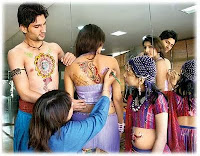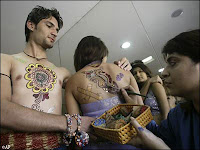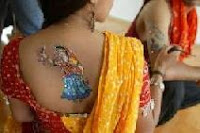Here is some retro-awesomeness for all of you who grew up in the 80's.




































































Home » All posts
Saturday, October 9, 2010
Extraordinary Things From The 80's Retro-awesomeness
Friday, October 8, 2010
Vostok - The World's First Space Beer

Vostok - The World's First Space Beer - From the dawn of civilization, people brewed beer, and wherever people went, beer followed. In the middle ages, beer helped monks survive long periods of fasting. Sailors commonly drank beer to help ward off scurvy. During the age of exploration, traveling long distances caused brewers to create new recipes.
To meet this challenge, space engineers from Saber Astronautics Australia have teamed with 4 Pines Brewing Company in a space race - to produce the world's first beer drinkable in space.



Source : Vostok Via Presurfer
Thursday, October 7, 2010
Gujarati Navaratri festival create temporary tattoos (mumbai)
Navaratri festival is very hot Gujarat.this festival is nine days long. Navrati starts and all youth activities start to his body Tattoo. Young people create temporary tattoos on his body to the enormous variety of styles and designs. In Mumbai Gujarati person creates a tattoo in his body, and a premium is to start at Rs 25 and goes up to Rs 399, depending on the size and quality of work.


















Johnson's World of Softness pop up billboard

People walk past Johnson's World of Softness pop-up billboard featuring live models advertising 24 hour body lotion, at Westfield Shopping Centre, in west London.
Source : Metro
Vietnamese Bank Offers Beer to Customers

A Vietnamese bank has started giving away beer to customers who make deposits. Western Bank launched the nationwide promotion on Wednesday, offering a large can of Bitburger beer imported from Germany for each one-month deposit of at least 7.5 million dong (£242) made until Nov. 25.
"We started this award before Tet, as every other bank has its own promotion," said a teller at the Vietnamese bank, which is based in the Mekong Delta city of Can Tho.
In the run-up to Tet, Vietnam's Lunar New Year festival, which usually falls in February, cash demand rises as companies pay year-end bonuses and consumers splash out.
Tropical Vietnam has a long tradition of beer drinking, introduced by French colonists in the late 19th century. Although local brews dominate the market, rising living standards have allowed city dwellers to taste foreign brands.
Authorities have been trying for months to get banks to cut interest rates, both on loans and deposits, so lenders have had to get creative in the fight for depositors.
Inducements have ranged from a tour of Europe to cars, crash helmets, bed sheets and blood pressure monitors.
Source : Telegraph
Wednesday, October 6, 2010
Automatic Cake Decorator

Mischer'traxler's automatic cake decorator uses a rotating platform to draw a flowery, spirograph-like design on its cakes. As a final touch, the mechanical arm drops sugar-pearls across the cake's surface.
The automatic cake decorator is part of an exhibit entitled "til you stop - how much is enough." You determine how decorated the cake gets by telling the machine when to stop. More icing please! (as long as it's of the cream cheese variety)





Source : Design Boom
Totally Unique Language in the Himalayas (Researchers Discover )
A Koro speaker talks to National Geographic Fellow Gregory Anderson in Arunachal Pradesh, India, as he makes a recording of the language.
In the foothills of the Himalayas, two field linguists have uncovered a find as rare as any endangered species—a language completely new to science.
The researchers encountered it for the first time along the western ridges of Arunachal Pradesh, India's northeastern-most state, where more than 120 languages are spoken. There, isolated by craggy slopes and rushing rivers, the hunters and subsistence farmers who speak this rare tongue live in a dozen or so villages of bamboo houses built on stilts.
The language—called Koro—was identified during a 2008 expedition conducted as part of National Geographic's Enduring Voices project. The researchers announced their discovery Tuesday in Washington, D.C. So many languages have vanished world-wide in recent decades that the naming of a new one commanded scientific attention.
"Their language is quite distinct on every level—the sound, the words, the sentence structure," said Gregory Anderson, director of the nonprofit Living Tongues Institute for Endangered Languages, who directs the project's research. Details of the language will be documented in an upcoming issue of the journal Indian Linguistics.
Prized for its rarity as an unstudied linguistic artifact, the Koro language also offers researchers a catalogue of unique cultural experience, encoded in its mental grammar of words and sentence structure that helps shape thought itself.
Languages like Koro "construe reality in very different ways," Dr. Anderson said. "They uniquely code knowledge of the natural world in ways that cannot be translated into a major language."
In an era of globalization, languages have been disappearing by the hundreds, edged out by English, Chinese and Spanish or suppressed by government practices. Of the 6,909 known languages, about half are expected to disappear in this century; every two weeks, the last fluent speaker of a language dies. This newest, with only 800 or so speakers, may be no exception.
"Even though this is new to science, this language is on the way out," said linguist K. David Harrison at Swarthmore College outside Philadelphia. Many younger villagers, often educated at boarding schools where only Hindi or English are spoken, are abandoning their parents' language. "Young people are not speaking it in the villages," Dr. Harrison said. "If the process continues, Koro will almost certainly become extinct."
Link via Ace of Spades HQ
Electric Bike Runs on Water

SiGNa’s fuel-cell powered electric bike will run for 60 miles on a single charge. More impressive is that it runs on water.
The bike itself is really just a showcase for the fuel-cell tech from the energy company. The cells uses sodium silicide in the form of a sand-like powder. Add this to water and it “instantly creates hydrogen gas.” This hydrogen is then used to generate electricity. Because no hydrogen is stored, the cells are safe, and excess electricity is stored in batteries for an extra boost when you get to a hill. The cartridges are hot-swappable and are fully recyclable.
The main advantage (apart from the safety aspect) is that you can just swap-in a new cartridge when you need it, instead of having to stop to recharge (the units weigh around 1.5-pounds each, less than most batteries). You also get better range: a battery-powered bike typically gets 20 to 30-miles on a charge. The downside is infrastructure: you can find a power-outlet pretty much anywhere in the world. Try finding a compatible fuel-cell in a backwater general-store.
The current units can be designed to put out anything from 1-Watt to 1-Kilowatt. Their futire is probably not in electric bikes but in bigger transportation. Imagine driving your car into the gas-station, popping the hood and swapping in a fuel-cell, just Like Doc Brown drops a tube of plutonium into his time-traveling DeLorean.
Pre-orders for the cells cartridges are being taken by SiGNa. For a bike, you’ll probably have a long wait [UPDATE: The bikes will be available next summer]
Source : Wired
Subscribe to:
Comments (Atom)


















